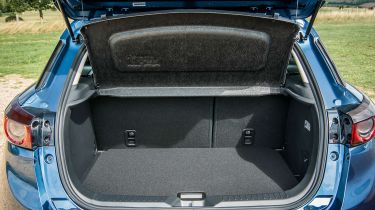Used Mazda CX-3 (Mk1, 2015-2020) review - How practical is it?
Although the front seats are comfortable, the Mazda CX-3 is rather cramped in the rear. Plus, the boot is small
Despite its chunky looks, the Mazda CX-3 is a compact car; it’s barely any bigger than the Mazda 2 supermini on which it’s based. Those neat dimensions pay dividends in town, where it’s really easy to manoeuvre in and out of tight parking spaces, for example, but it doesn’t translate into an especially roomy interior.
Dimensions and cabin design
The CX-3 is slightly larger than the old Nissan Juke, at 4,275mm long and 1,765mm wide, with a 2,570mm wheelbase. The Juke measures 4,135mm long and the same 1,765mm wide, plus it has a 2,530mm wheelbase. But it’s not surprising that there’s not much space inside when you compare the CX-3’s dimensions to those of the larger Mazda CX-5, which is 4,555mm long and 1,840mm wide.
Yet the smaller crossover plays a neat visual trick on the road, because it doesn’t really look any bigger than its big-selling Nissan rival. This is perhaps because it’s only 1,535mm tall, compared to 1,565mm for the Juke. The relatively low-down stance is key to the CX-3’s sporty feel from behind the wheel.
Up front, the CX-3 is pretty comfortable. The seats are supportive and quite low-set and the steering wheel adjusts for reach and rake, so it should be easy for any driver or front passenger to find a suitable seating position. The switch from a manual handbrake to an electric parking brake for 2018 has also freed up some space up front to make it feel even more comfortable.
That’s not the case for the back seats, though. Rear legroom stands at just 888mm, which isn’t much better than in the Mazda 2, and trails some key crossover class rivals by some distance. The CX-3 is just too tight in the back for a growing family.
Boot space
A 350-litre boot is pretty much bang on the crossover class average, but even so, as with many rivals, it’s much smaller than you’d get in a more affordable compact hatchback, and wouldn’t swallow a family of four’s luggage.
There is some help on hand in practicality terms, though – the boot has an adjustable floor that allows you to load shallow items under a removable board, and this also provides a flat load floor when the seats are folded. Do that and you get a maximum luggage capacity of 1,260 litres.
One area where the top-spec CX-3 Sport Nav version especially falls down is boot space. Its powerful Bose sound system features a subwoofer in the load bay that cuts capacity from 350 to 287 litres with the seats up. Still, there’s good underfloor storage, plus 1,197 litres of space if you fold the rear seats down.
Equipment and technology
Mazda's Kodo design treatment means the CX-3 gets the same slick styling cues as the brand’s 2 supermini, 6 family car and MX-5 roadster. The Sport Nav model is given an extra visual lift courtesy of its large 18-inch alloys (two inches bigger than SE Nav and SE-L Nav cars), LED headlamps and privacy glass for the rear windows.
Although the interior layout of the Mazda CX-3 feels a little lower-slung than in most crossovers – the company’s designers were clearly going for the sporty feel found elsewhere in the model line-up – the styling inside is basically very similar to the Mazda 2 and 3.
The instrument display is based around a simple single binnacle, which owners of other recent models in the Mazda range are likely to be familiar with, while dominating the centre of the dashboard is a seven-inch colour touchscreen. It’s actually quite similar in style to that of the old RX-8 coupe, although of course there’s much more technology on board.
Quality is excellent, and buyers can add leather and contrast stitching if they have the budget to dip into the options list. But even in standard guise, the CX-3 has a solid, well made feel.
The seven-inch infotainment system in the CX-3 is used across the Mazda range. It’s neither the simplest nor most intuitive set-up to use, but given that sat-nav, Bluetooth and DAB are standard across the line-up it offers a good level of functionality, with three years’ European map updates included.
The rotary Multimedia Commander controller is fairly simple to use, and is far simpler to use than the touchscreen system that's also on offer, and there are shortcut buttons to jump to the system’s key areas. However, the menu layout isn’t very logical, and simple tasks such as entering a destination or changing a DAB station require one too many inputs. The graphics aren’t as sharp as its rivals’ set-ups, either.
Sport Nav models also benefit from a seven-speaker Bose stereo, and while this compromises load space, at least it delivers a punchy sound for a system in a small car. Although the infotainment screen is well placed in your eye line on top of the dashboard, the Sport Nav’s standard colour head-up display is a useful feature, too.
Look out for the GT Sport model, introduced in 2017. Only 500 were built, each one benefiting from a special bodykit, new leather trim and 18-inch alloy wheels.
Safety
The Mazda CX-3 was awarded a four-star safety rating when it was crash-tested by Euro NCAP in 2015. Adult Occupant protection was rated at 85 per cent, while the Child Occupant rating was lower at 79 per cent. The Pedestrian safety score was 84 per cent, with Safety Assist rated at 64 per cent.
Standard equipment across the range includes electronic stability control, six airbags, hill-hold assist and an emergency stop signalling feature. Mid-range SE-L trim and above also feature lane-departure warning and autonomous emergency braking.







